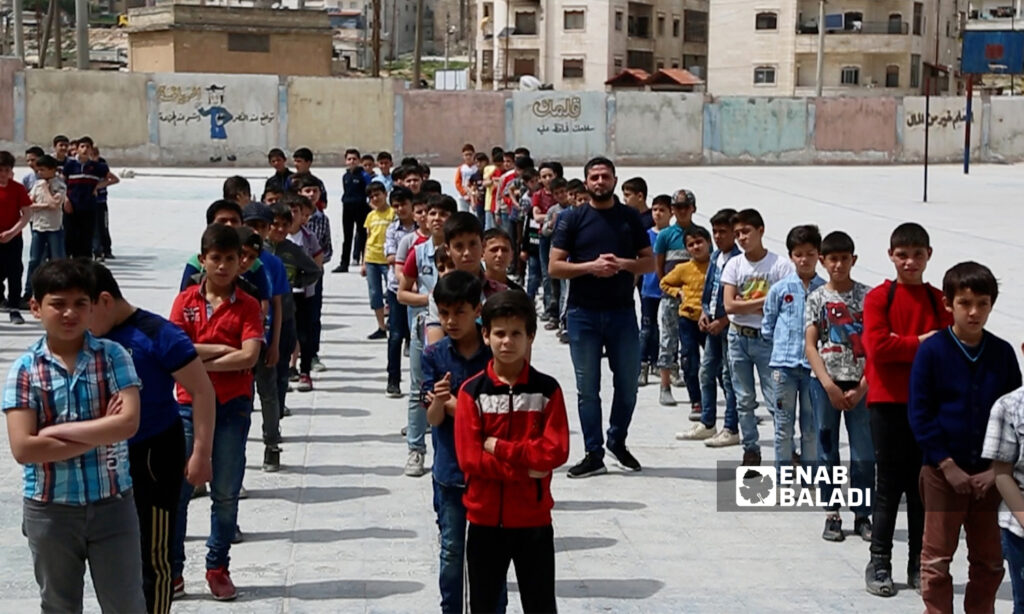Enab Baladi – Idlib
The 60-year-old Omar al-Hassan is still not accustomed to being unemployed. He sits in front of his house in the town of Harbanoush in the northern countryside of Idlib, with nothing to do but talk to a neighbor after almost 38 years in the education sector, where he taught in several schools and worked in various administrative positions.
Retirement is not the only thing that annoys al-Hassan.
“Now I am retired after reaching the legal age without any compensation. The directorate’s decision to terminate the work of teachers who have reached retirement age is unfair to teachers, as we have a shortage of qualified cadres in education,” al-Hassan told Enab Baladi.
The decision that al-Hassan is talking about was issued by the Idlib Directorate of Education in June, and it stipulates the termination of the service of employees in the directorate who have reached the age of 60, in accordance with the provisions of the directorate’s internal system.
Living concerns
A large number of unqualified teachers work in government schools in Idlib, and this decision includes 300 teachers out of 15,000, which is “a very small percentage,” according to al-Hassan.
Currently, the retired teacher does not have any other source of income or even a profession from which he and his wife can live.
“I cannot do other jobs after reaching this age. My livelihood has become at the expense of others,” al-Hassan said.
The decision did not include granting retirees any pension or any financial reward at the end of government service in the Education Directorate” of the Salvation Government.
At the same time, al-Hassan suggested “giving a pension of 50 US dollars to teachers,” and since there is no pension, the teacher should be left on the job, even if he is old, as he has long experience in education, and how to deal with children, parents and the school family.
The educational staff, including administrators, mentors, and teachers, can also benefit from his experience, he added.
Al-Hassan also suggested that the retired teachers be placed in a “consulting position,” not that their service be terminated to become like “a calendar sheet that was cut and thrown away,” as he described.
The same feelings and concerns about the future that al-Hassan lives in his home, away from the noise and disturbances of the students in the schoolyards, surround Ahmed Jabr, 61, who was teaching at the Boys High School of Harbanoush.
Jabr stressed to Enab Baladi that the teacher should receive financial compensation after being referred to retirement. It is “one of the axioms of government work in order to secure the rest of his life after 40 years in the education field.
“Last year, a decision was issued to refer those over 60 years of age to retirement, and then the extension was only for one year, and now a new decision was issued to terminate the service, which prompted me to submit a new request for an extension,” said Jabr, who does not know whether his request will be accepted or rejected.
Support is weak
The legal retirement age for workers is 60 for the second category, and 65 for the first, and retirees do not receive salaries or compensation, said the director of the Directorate of Education in Idlib, Mahmoud Ramadan al-Basha.
These categories are linked to administrative classifications within the internal system of the directorate.
Al-Basha also attributed the failure to grant retirees’ salaries or financial compensation at the end of service to “the lack of sufficient financial support to cover compensation for all workers.”
This decision was issued in order to provide the opportunity for university graduates to work, he added.
According to the estimates of the United Nations Office for the Coordination of Humanitarian Affairs (OCHA), education is one of the first three priorities in the region after managing services and early recovery issues.
The OCHA report, which was released on 14 July, revealed that the funding gap in the education sector in northwestern Syria amounted to 38.7 million US dollars.
The educational process in northwestern Syria is exposed to administrative and economic hardships that target the top of the pyramid in the process, which is the teaching staff, as many teachers have found themselves forced to leave their mission and their passion for the profession and engage in other activities to secure their day and families.

